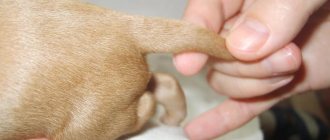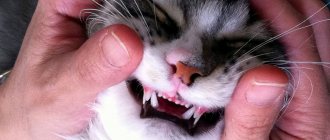Helminths and worms are parasitic worms that cause the appearance of parasites in humans and animals. Parasite eggs can be in the ground, on grass, in rivers and lakes, in raw animal products, on poorly washed fruits, etc.
You don’t have to let a cat outside, however, this does not guarantee that the animal will not become infected with helminths. Cat worms easily spread to people, and children are especially often infected with them.
A domestic cat can get worm eggs from our clothes or from outdoor shoes. A large number of varieties of worms present in the body of domestic animals can also cause harm to us. Kittens and cats can experience any type of helminths; parasites can settle in the intestines, lungs and other organs. As a rule, tapeworms or roundworms appear in the body of cats.
The only option to protect your pet from infection is to worm him regularly, without ignoring his protection from fleas.
At the Murkosha shelter, animals undergo mandatory preventive measures and, if necessary, undergo treatment for parasites.
Read more: “Treatment for parasites”
Deworming of domestic cats in our shelter is a set of special measures that are aimed at cleansing the animal’s body of eggs and larvae of worms and preventing the appearance of parasites.
Helminths infect the mucous membranes of various organs of the cat and live off their tissues and blood. Any parasites that infect an animal release substances during their life processes that can cause poisoning. Worms in a cat can cause weakness and decreased immunity over time. At an advanced stage, intestinal rupture may occur, and this can be fatal.
How can parasites settle in a cat's body?
This point often worries owners of domestic cats. The answer is quite simple - your pet’s diet contains raw fish or meat, waste, flies, all of which can cause infection. In addition, mother cats can transmit helminths to their kittens through milk.
Read more: “Proper nutrition for cats”
Worms can easily pass from cats to humans through skin tissue or fleas.
The presence of special signs of infection in an animal is determined by the degree of disease and the number of parasites in the cat’s body. Symptoms differ between cats and small kittens, and this is also influenced by the type of helminth present. The main signs of the presence of worms can be:
- vomit;
- diarrhea or frequent constipation;
- Individual larvae or even worms may be observed on the cat’s fur or near the anus;
- kittens and cats may be bothered by itching of the anus;
- there is stool with blood or mucus;
- round and dense belly;
- long-term weight loss;
- changes in appetite;
- cough, difficulty breathing;
- heavy shedding;
- underdevelopment of the kitten’s physical characteristics;
- fast fatiguability;
- pallor or yellowness of the mucous membranes;
- premature birth.
Cat owners need to take into account that these symptoms are similar to signs of various infections. If the cat is dewormed at this point, the course of the infection may become more complicated, which in some cases leads to death. In this case, it is necessary to establish an accurate diagnosis; this can only be done by a qualified veterinarian. In our Murkosha shelter, animals can receive timely and professional help.
Read about how to help your cat here: “Signs of an Unhealthy Cat”
If a pet owner suspects that their cat has worms, it is necessary to treat it immediately. You shouldn’t delay this, since the appearance of several signs of worms immediately indicates that parasites are already living in large numbers in your cat’s body.
How to understand that your pet is infected with helminths
There are many causative agents of helminthiases, so the symptoms of the disease vary. They also depend on the number of parasites, the type of organ inhabited by them, and the state of health of the animal. You can tell that your pet has worms by looking at some symptoms common to helminthiasis: the appearance of eggs or worms in the feces, changes in the cat’s behavior.
Obvious signs: worms in stool or vomit
The vast majority of parasitic worms live in the digestive tract. Having detached from the walls of the affected organ, they come out with feces under the influence of peristalsis. When removing the tray of an infected animal, you can notice small worms or white eggs in the excrement - this is the main sign of the disease. Sometimes worms are found in the anus. If a pet with an extensive helminthic infestation vomits, the parasites can be seen in the vomit, but in it they look a little different, like long transparent threads.
Changes in behavior and well-being
While in the digestive tract, parasites deprive the cat of a significant part of its nutrients, so the animal becomes lethargic. The pet feels very weak and gets tired quickly. He sleeps a lot, prefers to spend the rest of the time lying down, even if before that he was a lover of outdoor games. The cat’s attitude towards food changes; it can either refuse food or suffer from a brutal appetite. Vomiting often occurs after feeding.
You can also find out about the presence of helminths by the following signs:
- weight loss regardless of the amount of food consumed;
- digestive disorders: diarrhea, constipation (may alternate);
- bloated belly;
- cough;
- increased lacrimation, white thick discharge from the eyes;
- deterioration in the appearance of the coat;
- itching in the anus area.
Parasites in cats can cause coughing when it comes to lungworms, most commonly Capillaria aerophila, Aelurostrongylus abstrusus and Paragonimus kellicotti. Worm cough occurs when parasites enter the bloodstream through the intestinal wall and reach the lungs. Lungworms in cats cause not only coughing, but also shortness of breath, and sometimes fever. When helminthiasis passes into the chronic stage due to scarring of organ tissue, a cough can torment the animal for life.
How to remove worms from cats: a professional approach
If unskilled actions are taken, your animal may even die, so before treating worms, you need to clarify the type of parasites that your cat is infected with, as well as the presence of other infections. Currently, there are drugs for removing tapeworms, however, they will not be effective against, for example, roundworms. And broad-spectrum products can be dangerous for your cat.
At the moment, excellent foreign and Russian remedies are known for the treatment of different types of worms: Dirofen, Panacur, Polyvercan, Febtal, Profender (used once), Kanikquantel, Trontsil K, Prazitel, Pirantel (can be used even for kittens, guaranteed not to provoke poisoning) .
Never buy anti-worming medications at markets or street stalls; they should only be purchased at veterinary institutions or specialized pharmacies if you do not want to harm your pet.
Before deworming, it is necessary to remove fleas from the animal. This procedure should not be neglected, otherwise helminth eggs will reappear in the cat along with the insects. Give preference to flea control products, guided by the following nuances:
- no toxicity;
- the presence of the necessary labeling if the product is chosen for kittens;
- You should not choose external medications for a nursing or pregnant cat or kitten, they can be poisoned.
Diagnosis of parasitic disease
It is easy to guess that a kitten has helminthiasis when the worms (or their larvae or eggs) come out along with its feces. In other cases, the manifestations of this disease can easily be confused with symptoms of a cold, indigestion, or diseases of the internal organs. What should I do? To make an accurate diagnosis, contact a veterinary clinic. There, the pet will be given a referral for OAC, a coprogram, and, if necessary, an ultrasound of the heart or liver and an X-ray examination of the lungs will be performed. Based on the results of tests for worms, the kitten will be prescribed treatment. Which one will depend on the type of disease detected.
Features of the use of anthelmintic drugs
Tablets for removing helminths are divided into cats and kittens; you need to be careful in the dosage. An overdose of anthelmintic drugs can be fatal for a kitten, since almost any anthelmintic drug is toxic, especially those drugs that are used externally on the animal’s withers. They should not be used on old or infected cats or kittens.
For a small kitten, purchase a liquid suspension. Cats can be dewormed from 2 months of age, immediately before vaccination. However, there are products that are suitable for animals only from 3 months - Trontsil-K, Kanikvantel, Febtal.
Be attentive to your pets during treatment:
- you can inject Gamavit into the withers with a medicine for worms (the dose depends on age, varies from 0.5 to 3 ml);
- after the anthelmintic drug, be sure to give the cat any sorbent - it can be activated carbon (kitten - from 0.5 to 1 tablet, cat - 1-1.5) or Enterosgel (for kittens, dilute half a teaspoon according to the attached instructions, for adults you can give one teaspoon);
- After taking the drug, watch how your animal goes to the toilet; if the cat cannot go to the toilet, there is a possibility of intoxication. In this case, 5-7 ml of Duphalac and the same amount of Vaseline will help;
- if you are treating your animal, the process should be repeated after 10-12 days. If you dewormed your cat as a preventive measure, one course will be enough.
Remember, cats expecting offspring or nursing kittens should not be given anthelmintics!
Alternative methods
Some cats are so resistant that owners choose other deworming options. The most preferred ones are the following:
- Preparation of suspension. Study the instructions, making sure that there is no prohibition on crushing the tablet. If you don’t understand something, consult a veterinarian. Grind the dosage form into powder. Grind the tablet by rubbing. Dilute with water. Draw it into a syringe, remove the needle and slowly pour it into the cat’s cheek. It is necessary to ensure that she does not spit out the contents.
- Giving medicine with food. Grind the tablet, mix with sour cream 20% fat. Apply the mixture to your nose. The cat, licking its lips, swallows the medicine.
How to give the tablet to cats and kittens?
If you want to cure a kitten, it is better to immediately buy a liquid suspension. When it is necessary to cure worms in an adult animal, tablets should be given in one of the following ways:
- The cat should sit with its back to you; it is better to sit it on your lap, since when trying to escape, the animal begins to back away. With one hand you should unclench the cat's jaws, with the other you should put the deworming drug into the mouth. Then stroke the animal's throat to trigger the swallowing reflex;
- You can crush the tablet and dissolve it in liquid. Pour the resulting mixture from a syringe without a needle behind the cat’s cheek, gently hold its muzzle so that it does not spit out the medicine;
- the cat is ready to swallow even an unloved treat if you show extra affection, pet it and talk to it. The crushed tablet can be mixed with liquid food, boiled minced meat or chopped meat, then given to a kitten or cat;
- You can treat a particularly violent pet for helminths in this way - wrap it in a blanket, leaving only the head exposed. Place the cat with its back facing up to prevent choking. After that, use method 1 or 2;
- You can worm a cat without it even realizing what happened. To do this, you can use a small piece of butter into which you need to roll the tablet. Place this pellet in the freezer for 10-15 minutes. Use the swaddling method, making sure your cat swallows the oil.
How to worm a kitten at home
The kitten is dewormed at home using purchased veterinary or folk remedies. In the first case, you can give tablets, drops, suspensions (for example, Prazitel , Prazitsid , Dironet Junior ). More often they are designed for adult animals, so you need to choose the right dosage so that the kitten does not get poisoned. Only a veterinarian can do this.
There are ready-made preparations that are designed for kittens. Then the dosage is indicated in the instructions. Some medications are given for 2-3 days. But this is an additional burden on a fragile body. Therefore, suspensions are more preferable for them.
You can only give your kitten pills if you know the type of parasite. You cannot choose a medicine at random - it can easily cause harm. To destroy helminths, it is fed twice with a break of 10-14 days, for prevention - once. Folk remedies are safer, but they are less effective and will have to be used repeatedly.
If after treatment the animal is poisoned
As a rule, possible complications after treatment for worms arise due to poisoning of the body, provoked by the decomposition of dead parasites inside the cat. Malaise sometimes occurs due to inaccurate dosage of medications used to treat an infected pet, as well as due to intolerance to a particular medication. If vomiting occurs, the cat has difficulty breathing, muscle tremors or increased lethargy are observed, it is necessary to urgently call a veterinarian.
At the Murkosha shelter, worms are poisoned from admitted kittens only after all possible infections have been excluded and under the strict supervision of a veterinarian. Treatment should begin no earlier than 2 weeks after you take the kitten into your home, provided that it is absolutely healthy. Also, you should not immediately use different drugs - for helminths, fleas, ticks, etc., otherwise intoxication cannot be avoided.
Contraindications to deworming in kittens
Despite the large selection of modern anthelmintic drugs for kittens, deworming for preventive and therapeutic purposes is not recommended for self-prescription in the following cases:
- chronic viral or bacterial infections;
- general weakening of the body after surgery or serious illness;
- severe exhaustion of the body;
- serious disorders associated with liver and kidney disease;
- previously identified intolerance to anthelmintic drugs;
- significant helminth infestation.
In these cases, deworming is carried out only under the strict supervision of a doctor or is postponed until the condition stabilizes.
In any case, consultation with a specialist and selection of an individual treatment scheme is highly desirable.
Preventive measures for the appearance of parasites
Worms can appear even in the healthiest cat, so prevention won’t hurt:
- make sure your cat does not suffer from fleas;
- remove raw foods from the animal’s diet;
- regularly replace the filler in the pot, do not forget to disinfect the tray;
- keep your shoes out of reach of your pet;
- adhere to basic hygiene rules - wash your hands thoroughly after interacting with your cat, do not allow licking of the face;
- It is necessary to deworm pets 4 times a year; if a cat walks outside, deworming should be carried out more often;
- Parasite prevention should be done 2 weeks before vaccinations.
This point must be taken into account, since vaccination is the receipt by the animal’s body of a certain set of weak viruses. The cat’s immune system processes the received funds for some time. If parasites are present, the animal’s immunity is already weakened. Therefore, the cat’s body will not be able to properly resist the viruses introduced with the vaccination, that is, the vaccination will lose its effect. In addition, vaccination can cause illness or poor health of the animal.
If you have taken several cats or kittens into your home, prevent and treat helminths for all animals at the same time. Products used for humans should not be used to treat cats.
Why do you need to worm?
Once in the animal's body, helminths poison it, damaging many internal organs. If you do not regularly give anthelmintic to your cat, the parasites will form a whole ball of worms in the intestines, which will constantly grow. When the ball reaches a large size, the intestines can rupture, which leads to the inevitable death of the animal.
The parasites eat all the beneficial substances, and the cat begins to experience a deficiency in essential vitamins and microelements. Parasites can live in the kidneys, liver, lungs, heart, which leads to disruptions in the functioning of these organs. The cat's immunity decreases and he is often exposed to infectious diseases.
The helminths present in a cat can be easily transmitted to people, which is dangerous, especially for children. Veterinarians recommend deworming a cat immediately after bringing it into your home and repeating the procedure periodically. This will help maintain the health of the animal and the people around it.
Anti-worm medications for kittens. When should you give and what exactly?
The presence of worms is considered a serious disease. Not only people, but also animals suffer from parasitic worms. Young pets, such as kittens, are most often infected. Unfortunately, most cat owners face a similar problem.
It is impossible to protect a furry pet from infection with worms, even if it does not go outside. You should know that helminths pose a huge danger to pets.











